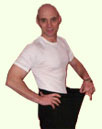The SCIENCE behind the DIET OF NATURE
 Diet of Nature is based on latest
breakthroughs in nutritional science.
Diet of Nature is based on latest
breakthroughs in nutritional science.
The breakthroughs have not been done by me. I don’t have rats in my garage and I don’t conduct experiments. What I do is read widely and than translate this information into simple language and a practical lifestyle plan.
Here is some of the research Diet of Nature is based on:
Ainsworth, Claire. “How to Burn Off Blubber Without Moving a Muscle.” New Scientist, 2/12/2000.
Allport, Susan. “The Primal Feast: Food, Sex, Foraging, and Love.” New York: Harmony Books, 2000.
Arndt, Klaus "Low Carb Rezepte für die Anabole Diät - Superschlank & kerngesund durch ketogene Ernährung mit den richtigen Fettsäuren" Novagenics Verlag 2003.
Arnot, Robert. “Dr. Bob’s Revolutionary Weight Control Program.” New York: Little, Brown, 1997.
Audette, Ray, et al. “Neanderthin: Eat like a Caveman to Achieve a Lean, Strong, Healthy Body.” St. Martin, 2000.
Berger-Lenz, Monika "Wir haben das Fettsein dicke! Die Wahrheit über ketogene Ernährung, LowCarb Diäten" FAKTuell Verlag Berger-Lenz und Christopher Ray, 2003.
Berkson, Lindsey D. “Hormone Deception: How Everyday Foods and Products Are Disrupting Your Hormones – and How to Protect Yourself and Your Family.” Chicago: Contemporary Books, 2000.
Bond, Geoff "Natural Eating: Natürlich fit und gesund - essen, was der Körper wirklich braucht" München 2001.
Cordain, Loren, Ph.D. “The Paleo Diet: LoseWeight and Get Healthy by Eating the Foods You were Designed to Eat.” John Wiley, 2002.
Ehrensperger, Dr. C. P. "Krebs - Krank? ...Warum die Krebskrankheit die Folge einer jahrelangen chronischen Kohlenhydratvergiftung ist!", Institut für Kreative Forschung, Schweiz 2001
Garcia, Oz. “The Balance.” New York: Harper Collins, 1998.
Garcia, Oz. “Look and Feel Fabulous Forever.” New York: Regan Books, 2002.
Gittleman, Ann Louise. “Super Nutrition for Men.” New York: M. Evans and Company, 1996.
Gonder, Ulrike "Fett! Über fette Lügen und ungesättigte Versprechungen" Hirzel, Stuttgart: 2004
Kant, Ashima K. “Consumption of energy dense, nutrient poor foods by adult Americans: nutritional and health implications.” American Journal of Clinical Nutrition. October 2000.
Ludwig, David S., Karen E. Peterson, and Steven L. Gortmaker. “Relation between consumption of sugar-sweetened drinks and childhood obesity: a prospective, observational analysis.” The Lancet. 17/2/2001.
Lutz, Wolfgang, Dr. „Leben ohne Brot. Grundlagen der kohlenhydratarmen Ernährung“ 15. erweiterte Auflage, Informed, München: 2004
Kwasniewski, Dr. Jan "Optimal essen" Heinrich A. Güttner, Stuttgart 2002.
Mallek, Henry, Ph.D. “The New Longevity Diet: How to Stay Young, Stay Healthy, Stay Slim by Eating the Foods You Love.” New York: Putnam Publishing Group, 2000.
Peeke, Pamela M. “Fight Fat After Forty.” New York: Viking Press, 2000.
Schwartz, Erica. “The Hormone Solution: Naturally Alleviate Symptoms of Hormone Imbalance from Adolescence Through Menopause.” New York: Warner Books, Inc., 2002.
Seifert, Dr. Siegfried "Ernährung und Verhalten an der Schwelle zum Dritten Jahrtausend. Länger und aktiver leben mit endorphin - bilanzierter ketogener Ernährung" 2001, Books on Demand.
Sheats, Cliff. “Lean Bodies.” New York: Warner Books, 1995.
Simontacchi, Carol. “The Crazy Makers: How the Food Industry Is Destroying Our Brains and Harming Our Children. New York: Penguin Putnam Inc., 2000.
Somer, Elizabeth. “The Origin Diet.” Oval Books, 2002.
Ungar, Peter S., Mark F. Teaford. “Human Diet: Its Origin and Evolution.” Bergin & Garvey, 2002.
Wharton, Charles Heizer. “Metabolic Man: Ten Thousand Years From Eden.” Winmark Pub, 2002.
